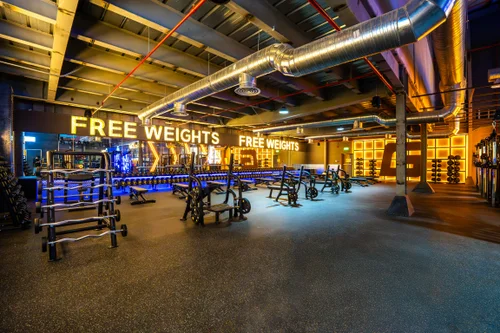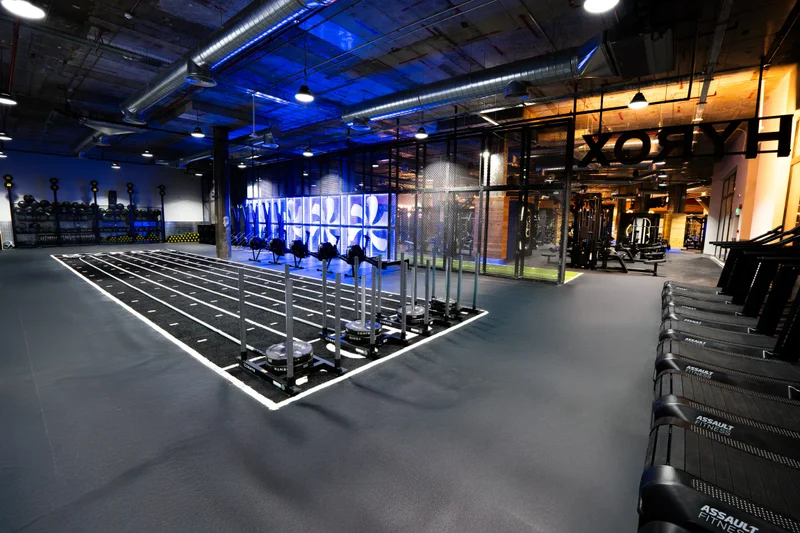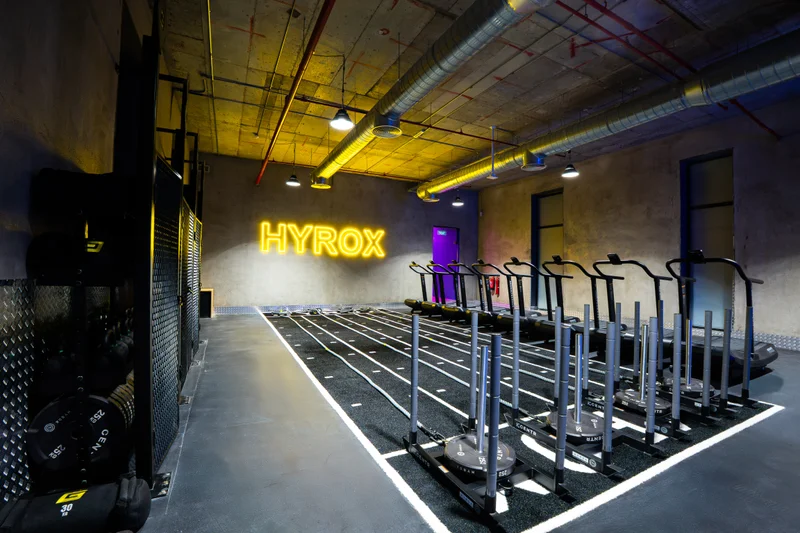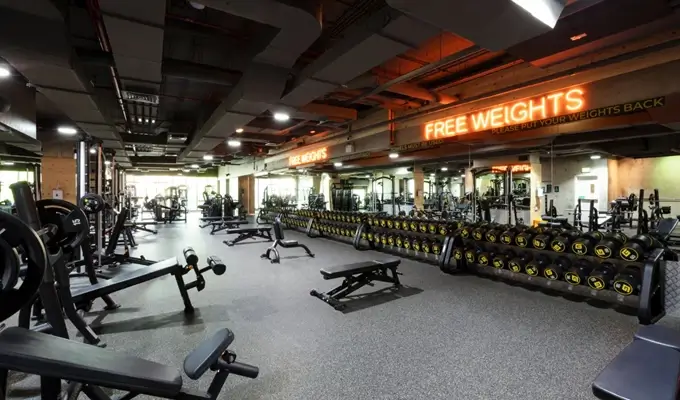Fuel your fitness journey the smart way with GymNation’s FREE Protein Calculator. In just seconds, you’ll discover exactly how much protein your body needs each day based on your weight, activity level, and goals.
Whether you’re focused on building lean muscle, losing weight, boosting performance, or supporting your teen’s nutrition, this simple tool gives you the personalised intake you need to succeed.
Backed by science and designed for everyone, our Protein calculator makes it easy to take control of your diet and see real results. Plus, you can claim a FREE Day Pass at GymNation and experience the Middle East’s best-value gyms firsthand with world-class equipment, expert trainers, and an unbeatable community.
SIGN UP FOR YOUR FREE DAY PASS TODAY!
Why Protein Matters
Protein is not just for bodybuilders lugging around gallon-sized shaker bottles. It is the building block of the human body, essential for repairing tissue, supporting muscle recovery, and keeping countless functions running smoothly. Meeting your daily protein requirement as part of a balanced diet is crucial for health, muscle gain, recovery, fat loss, and long-term wellbeing. From helping you bounce back after a tough session, to keeping you full during a calorie deficit, to protecting strength as you age, protein is always on the job.
Most people are told they need 0.8 g per kg of body weight, which is the official recommended dietary allowance (RDA). The truth? That amount only prevents deficiency and sets a baseline for the general population. If you train, your recommended daily protein intake is likely higher. Active adults usually need between 1.2 and 2.0 g per kg to build muscle, recover properly, and maintain a healthy body composition. Fall short on protein intake and you risk fatigue, muscle loss, weaker immunity, and poor recovery.
That is where our free protein calculator comes in. Enter your details to get a personalised daily protein intake target instantly. Following a vegan or vegetarian diet? Pay extra attention to your protein sources to make sure you are covering all the essentials. A vegan diet requires variety and a focus on complete proteins to meet all amino acid needs. Both a vegetarian or vegan diet can meet protein requirements with proper planning and combining plant-based proteins, so you can get everything you need without compromise.
Protein Calculator
Our protein intake calculator in kg and lbs is free, quick, and accurate. It helps you find the right protein target for your health and fitness goals, whether you are chasing muscle building, fat loss, or simply better wellbeing.
How does the protein calculator work?
The calculator is created using evidence-based sports nutrition guidelines using your own body metrics such as weight, age, activity level, and overall energy intake to estimate your optimal daily protein intake.
It provides a personalised recommendation in grams of protein per kg of body weight, helping you find the right protein intake to support muscle growth, recovery, and overall health, so you can plan your nutrition with confidence.
Protein Intake Chart (Grams Per Day)
Here is a simple example of daily protein intake, showing grams per kg of body weight depending on the goal:
|
Body Weight |
General Fitness (1.2 g/kg) |
Build Muscle (1.6 g/kg) |
Intense Training (2.0 g/kg) |
|
60 kg |
72 g |
96 g |
120 g |
|
70 kg |
84 g |
112 g |
140 g |
|
80 kg |
96 g |
128 g |
160 g |
Daily Protein Needs Explained
-
RDA (0.8 g/kg): The bare minimum to prevent deficiency.
-
Active adults (1.2–2.0 g/kg): A range that supports better performance, recovery, and results.
-
Muscle growth sweet spot (~1.6 g/kg): Backed by research as the most effective level for building and maintaining muscle.
-
Higher intake (up to 2.2 g/kg): Useful for highly trained individuals or during weight loss phases, where extra protein helps preserve lean mass and supports fat loss.
Example: A 70 kg person aiming to build muscle should target around 112 to 140 g protein per day.
Protein Calculator for Building Muscle
Looking to bulk up? Aim for the higher end of the range (1.6–2.0 g/kg). A higher protein intake, paired with strength training, helps you build muscle mass and support body composition goals. Protein provides the amino acids your muscles need, particularly leucine, which triggers growth. Just remember: even with high protein, consuming excessive calories can still lead to fat gain. Balance matters.
Protein Calculator for Teens
Active teens are growing fast, so their protein needs are higher than average. A safe range is 1.2 to 1.8 g/kg depending on training.
For example, a 60 kg teen who trains regularly might need 72 to 108 g daily. Eggs, chicken, Greek yoghurt, dairy products, and plant-based combinations like rice with beans are excellent options. It is also important to include complete protein sources so all essential amino acids are covered.
Protein shakes can help too, but they should complement meals, not replace them. For teens avoiding animal products, pea protein or other plant-based supplements can be a useful choice.
Best Sources of Protein
Protein does not mean eating plain chicken breast at every meal. Variety is the spice of life (and gains):
-
Animal-based: Chicken breast, eggs, fish, lean beef, Greek yoghurt, paneer. These are complete, high-quality proteins with all the essential amino acids needed for muscle growth and recovery.
-
Plant-based: Lentils, chickpeas, beans, tofu, quinoa, oats. Most plant proteins are incomplete, but mixing foods like rice with beans gives you a full amino acid profile. Plant-based protein is especially important for vegetarians and vegans — combine different sources to get everything your body needs.
-
Snacks and supplements: Whey shakes for quick absorption, casein before bed for slow release, and nuts for easy snacks. Protein supplements can also help boost your intake and support muscle repair, especially after workouts.
GymNation tip: Spread your protein like peanut butter — evenly. Aim for 30–40 g at each main meal and top up with snacks or a shake.
Protein Needs for Weight Loss
If you are cutting calories, protein is your best ally. A high-protein intake of 1.6–2.4 g/kg helps preserve muscle mass while supporting fat loss in a calorie deficit. For example, a 70 kg person aiming to lose fat should target 110–170 g protein per day alongside resistance training. Protein keeps you full, supports metabolism, and helps maintain strength while minimising muscle loss during dieting.
Protein Timing and Distribution
-
Pre and post workout: A shake or protein-rich meal supports recovery and muscle repair.
-
Throughout the day: Spread protein evenly across three to four meals. Eating protein regularly helps muscle protein synthesis, supports recovery, and maximises gains.
-
Before bed: Casein yoghurt or cottage cheese provides slow-release fuel for overnight muscle repair.
OTHER FITNESS CALCULATORS
FAQs About Protein Intake
How do I calculate my protein intake?
Multiply your weight in kilograms by 1.2–2.0 depending on your activity level, or use our free protein calculator for a personalised target.
How much protein a day for 70 kg body weight?
Between 84 and 140 g per day, depending on goals and training intensity.
Is 100 g of protein a day too much?
Not for most active adults. It’s within the safe range. If you have kidney issues or other medical concerns, check with a doctor first.
How much protein does a 60 kg woman need to build muscle?
Around 96 g daily at 1.6 g/kg. This supports muscle growth, recovery, and overall health.
How much protein is in 100 g paneer?
About 18 g of protein.
How to eat 200 g of protein a day?
Split into four to five meals with 40–50 g each. Use lean meats, dairy, legumes, eggs, and shakes to make hitting your target easier.
How to get 60 g of protein a day?
Think three meals with ~20 g each: eggs at breakfast, chicken at lunch, lentils or beans at dinner.
What is 30 g of protein?
Roughly one chicken breast, four eggs, or 200 g of Greek yoghurt.
How to get 120 g of protein a day?
Plan for four meals with 30 g of protein each. Adding a shake can help if you fall short.
How much protein per kg?
Most active adults need between 1.2 and 2.0 g/kg daily. Highly trained athletes may benefit from slightly more.
How much protein a day to lose weight?
Aim for 1.6–2.4 g/kg while in a calorie deficit. Higher protein intake helps preserve muscle and supports fat loss.
How much protein is in roti?
Around 3 g in a medium roti.
Which food has the highest protein?
Lean meats like chicken, tuna, and beef top the list. Protein powders are also a concentrated source of protein.
How much protein is in oats?
About 12 g per 100 g of dry oats.
Does protein affect kidney function?
For healthy people, high-protein diets are safe. If you already have kidney disease, speak to a doctor before increasing intake.
How to eat 100 g of protein a day?
Aim for three to four balanced meals with protein-rich foods such as eggs, chicken, yoghurt, lentils, and nuts. A protein shake can help fill gaps.
What are the best sources of protein?
Chicken, fish, eggs, Greek yoghurt, paneer, beans, tofu, oats, and protein powders are all excellent sources.
What is protein deficiency and what are the symptoms?
Not eating enough protein can lead to fatigue, muscle loss, weak immunity, poor recovery, and impaired body composition.
How does energy intake affect protein needs?
If you’re in a calorie deficit or training intensely, your protein requirements increase to help maintain muscle mass and recovery.
How can I meet my protein needs with dietary restrictions?
Combine different protein-rich foods (e.g. rice with beans, or tofu with quinoa) to create a complete amino acid profile. Pea protein and other plant-based powders can also help boost intake.
RESOURCES
Protein and exercise
Effect of protein supplementation
High protein intake and its effects on body composition
Are you getting enough protein?
How much protein to build muscle
Protein calculator for weight gain



























































































